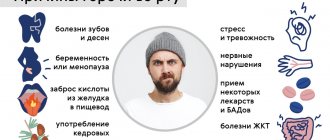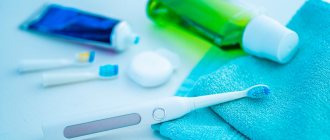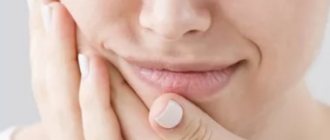Why does the bitter taste appear?
A bitter taste in the mouth appears due to the reflux of the contents of the duodenum into the stomach or esophagus and oral cavity.
This feeling is troubling not only because of gastrointestinal diseases. The reason may be the presence of an infection in the body, exposure to medications, insufficient oral hygiene, during pregnancy, due to a lack of vitamins, an excess of fried heavy foods, alcohol, and coffee drinks. Gum disease is accompanied by a feeling of taste in the mouth due to the growth of bacterial flora. With dentures and poor oral hygiene, bacteria accumulate, multiply, and a bitter taste appears in the mouth.
When taking chemotherapy drugs, antibiotics, or antihistamines, bitterness in the mouth can be a side effect.
Dysgeusia is a taste disorder in which taste perception is altered. Dysgeusia can occur during pregnancy, in smokers, in older people, and in mental illness.
Causes of bitter taste in mouth
Poor quality food
When eating poorly prepared, burnt foods, a specific taste of bitterness appears in the mouth. The unpleasant sensation decreases after drinking water, but the residual aftertaste can last up to 30-40 minutes. A bitter taste on the mucous membranes of the mouth occurs when eating nuts and seeds, which contain fatty acids that break down to form bitter chemical compounds. The symptom is not accompanied by pain or dyspeptic disorders.
Age-related changes
In older people, gradual atrophy of the mucous membrane occurs, as a result of which the ability to distinguish tastes is lost. Therefore, during a meal, the bitter taste is most pronounced, and the remaining taste qualities of the food are not perceived. The elderly complain of bitterness felt in the mouth regardless of the type of food, associated with a decrease in saliva production and activation of pathogenic microflora.
Smoking
Nicotine and various harmful tars that make up cigarettes linger on the mucous membrane of the mouth and cause a bitter taste. Chewing gum or sucking on mints can help reduce the discomfort. Smokers also note a decrease in the ability to perceive the taste of food. If you feel a metallic taste in your mouth against the background of constant bitterness, you should immediately consult a doctor.
Pregnancy
The periodic development of a bitter taste in the mouth during gestation is caused by natural causes. Due to the increased production of the hormone progesterone, the flow of bile into the intestinal lumen is disrupted, bile acids are thrown into the overlying sections of the gastrointestinal tract and cause discomfort. A bitter taste in the first half of pregnancy can occur with severe toxicosis; the irritating taste intensifies after an attack of vomiting.
The symptom sometimes occurs in pathological conditions that are provoked by pregnancy. The most common etiological factor is cholestasis of pregnancy. Bitterness in the mouth begins to bother a woman from the 32nd week of gestation. The irritating bitter taste is accompanied by severe skin itching, lightening of the stool and darkening of the urine. If such signs appear, you should contact an antenatal clinic.
Functional dyspepsia
Periodic disturbances in the coordinated functioning of the gastrointestinal tract are recorded in more than 80% of adults. The bitter taste is caused by slow digestion of food and weakened intestinal motility. An unpleasant feeling often occurs immediately after eating against the background of heaviness in the stomach and flatulence. The feeling of bitterness can be relieved by drinking water with lemon juice or mint candies.
The clinical picture of dyspepsia is more typical for young, emotionally labile patients. Schoolchildren and students often experience a bitter taste in the mouth and abdominal cramps during exams. The symptoms are short-lived, in most cases the condition returns to normal within 1-2 days after the stress factor disappears. If bitterness is accompanied by severe unbearable pain and diarrhea, consultation with a specialist is necessary.
Hepatitis
Liver damage has various causes, but the manifestations of all clinical variants are similar. A bitter taste in the mouth as an initial symptom of hepatitis is more often observed with chronic inflammation of the liver parenchyma. An unpleasant sensation develops half an hour to an hour after eating, but can also appear in the morning. If a patient with liver inflammation falls asleep during the day, he wakes up and feels a sharp, irritating taste in his mouth.
In patients with chronic viral hepatitis B and C, bitterness on the oral mucosa persists for 2-3 months, and in the case of fibrotic degeneration of the liver, it becomes a permanent symptom. Toxic hepatitis is characterized by short-term uncomfortable taste sensations that disappear after intensive therapy. The bitter taste is aggravated by pain and heaviness in the right hypochondrium, nausea, vomiting mixed with bile.
Biliary system damage
Disturbances in the functioning of the biliary organs cause erratic, uncontrolled secretion of bile, which is associated with the appearance of a feeling of bitterness. With mild severity of the disease, a bitter taste is provoked only by the abuse of fatty and fried foods and alcoholic beverages. The symptom is accompanied by nausea, dull pain in the right hypochondrium, and increased frequency of bowel movements. The condition improves after a few days of a gentle diet.
With severe inflammatory or destructive changes in the biliary system, a bitter taste constantly bothers a person. In the morning, severe bitterness and nausea are felt due to the flow of bile into the stomach and esophagus. The appearance of white or grayish feces is typical, and sometimes painful skin itching occurs. The main reasons for the development of a bitter sensation in the mouth:
- Functional disorders
: hyperkinetic dyskinesia, hypotonic insufficiency of the sphincter of Oddi. - Inflammatory causes
: cholecystitis, cholangitis, cholecystocholangitis. - Cholelithiasis
. - Parasitic infestations
: opisthorchiasis, echinococcosis, giardiasis.
Pathologies of the gastrointestinal tract
Almost all disorders of the digestive tract are accompanied by an unpleasant taste in the mouth, since they provoke disturbances in the digestion of food and the secretion of bile into the duodenum. With chronic gastritis and duodenitis, a person periodically experiences bitterness in the oral cavity against the background of errors in diet and nervous strain. Bitter taste is more often associated with food intake.
Pancreatitis and other pathological causes of the pancreas are manifested by a change in taste perception. There is an unpleasant bitter taste, which is often combined with a rotten odor from the mouth. With exacerbation of pancreatitis, the feeling of bitterness intensifies, nausea is noted, and vomiting with impurities of undigested food and bile is possible. Patients also notice a grayish or yellow coating on the tongue.
Dental diseases
The impact of a bacterial cause on the oral cavity causes the development of purulent stomatitis and ulcers, which are accompanied by the appearance of bitterness in the mouth. The symptom is a constant concern; the intensity of the unpleasant taste sensation does not depend on food intake. A specific bitter taste combined with bad breath is characteristic of deep caries.
A bitter taste is observed after medical manipulations in the mouth. When choosing a low-quality material for fillings, it gradually begins to react with salivary enzymes and is destroyed, causing an unpleasant taste. Such symptoms usually occur in the initial period after the installation of dentures. Bitterness is associated with the presence of a foreign object in the mouth. If the symptom is accompanied by toothache, you need to visit a doctor.
Neurological disorders
The symptom occurs when the taste nuclei of the brain are damaged. Patients complain of a bitter taste in the mouth, which appears for no apparent reason and does not disappear after brushing their teeth. The clinical picture is characterized by a perversion of taste: sweet is perceived as sour or salty and vice versa. Bitterness on the oral mucosa occurs after a stroke or traumatic brain injury. In older people, the symptom is often caused by Alzheimer's disease.
Complications of pharmacotherapy
Most often, a bitter taste develops during antibiotic treatment. These drugs suppress beneficial microflora and disrupt the activity of salivary lysozyme, as a result of which fungal microorganisms are activated. Patients note a constant bitterness and burning sensation in the mouth, which intensifies while eating. The symptom is also provoked by other medicinal causes: taking chemotherapy drugs, antihistamines, cholekinetics.
Rare causes
- Diseases of the respiratory system
: alveolitis, pneumonia, purulent bronchitis. - Endocrine diseases
: hypothyroidism, hypocortisolism, diabetes mellitus. - Tumors
: hepatocellular carcinoma, stomach cancer, pancreatic head cancer. - Unloading
and
dietary therapy
.
How to get rid of bitterness in your mouth
Treatment depends on the diagnosis.
If these are diseases of the gastrointestinal tract (gallbladder, pancreas, liver), then the doctor prescribes drug therapy and dietary nutrition. Medicines used include choleretic drugs, antibiotics, antispasmodics for pain, prokinetics for synchronous functioning of the gallbladder and ducts, and sedatives. If bitterness in the mouth appears after eating fatty, fried, spicy foods, then it is necessary to adjust the diet and introduce healthy foods into the diet.
If you have GERD, you must follow some recommendations - do not lie down after eating for half an hour, do not bend over after eating, do not wear tight clothes that compress the stomach, sleep with the head of the bed raised.
Diagnostics
The most common causes of a bitter taste in the mouth are gastrointestinal diseases, so the patient should consult a gastroenterologist. First, complaints and medical history are collected, and the connection between bitterness and eating habits or time of day is clarified. Next, special laboratory and instrumental studies are used, the most informative of which are:
- Sonography
. The ultrasound method is indicated for studying the state of the digestive tract, identifying inflammatory and destructive changes, and neoplasms. A targeted ultrasound of the liver and gallbladder is performed. To detail the condition of the liver parenchyma, elastometry is used - a modern non-invasive method for determining the degree of fibrosis. - Duodenal sounding
. To prove the connection of the bitter taste with biliary diseases, 5 portions of bile are taken sequentially. The specialist evaluates the amount and rate of bile entering the intestines naturally and with pharmacological stimulation. Next, a bacteriological examination is performed. - Endoscopic examination
. To diagnose diseases of the esophagus and gastroduodenal zone, endoscopy is prescribed. During endoscopy, attention is paid to the integrity of the mucous membrane, the presence of areas of inflammation or atrophy. The condition of the major duodenal papilla and the initial parts of the duodenum is checked and a biopsy is performed. - Stool analysis
. Many diseases that are characterized by a bitter taste in the mouth cause specific changes in the stool. In case of violations of the bile secretion function, a large number of fatty inclusions are found in the stool; in case of damage to the pancreas, the stool contains undigested fibers and large carbohydrate molecules. - Laboratory diagnostics
. Women must be tested for hCG and sex hormones to exclude or confirm pregnancy. In a biochemical blood test for cholecystitis, the levels of bilirubin and the enzyme alkaline phosphatase are increased. If viral causes of hepatitis are suspected, serological testing of markers is required. - Additional methods
. An examination by a dentist is necessary to detect carious cavities, chronic periodontitis and other pathologies that cause a feeling of bitterness in the mouth. To diagnose lesions of the biliary system, cholangiopancreatography is performed. Patients with a complicated medical history should be examined by a neurologist.
Diet
The diet should include soft, well-chopped food. Gentle cooking methods - steam, bake, boil, stew. Include puree soups and cream soup in your diet. Bread can be consumed dried, yesterday's bread made from first and second grade flour. Meat – chicken, turkey, lean parts of beef, lean fish. Eggs should be in the form of omelettes, steamed in the oven. Food should be warm, not cold or hot. If there is a symptom of bitterness in the mouth, it is necessary to exclude sausages, smoked foods, fatty, fried, canned, and pickled foods from the diet. It is completely necessary to exclude alcohol, spicy foods, coffee, chocolate, carbonated drinks, pork, and some legumes.
Causes
Why does bitterness appear on the lips? This phenomenon may be due to:
- with gastrointestinal disorders;
- disorders of the liver;
- taking antibiotics and other strong medications;
- long-term smoking;
- poisoning with chemical components - phosphorus, mercury, lead;
- the presence of parasites in the esophagus or intestines;
- disruption of the functioning of the endocrine system;
- poor oral hygiene and oral diseases;
- hormonal imbalances.
Bitterness on the lips can occur at different times. Depending on this, the reasons differ:
- A morning symptom indicates inflammation of the liver or gallbladder.
- After the dentist - allergies to medications used by the doctor.
- With physical activity - liver disease.
- After eating - ailments of the digestive system.
- When overeating or eating fatty foods - inflammation of the gallbladder or liver.
- Combination with heartburn – acid reflux.
- Constant bitterness – oncology, mental, endocrine problems.
- Bitterness, which appears for a short time, can occur after drugs that negatively affect the gastrointestinal tract and liver.
These are the main causes of bitterness on the lips. Whatever the provoking factor, it causes discomfort. Therefore, you should find out the cause as quickly as possible and begin treatment.
The “character” of bitterness will tell you about the problem
If you have a bitter taste in your mouth and are thinking about what it all means, then see the table below.
| Symptom | Possible pathology |
| Bitterness appears in the morning | It is necessary to check the liver and gallbladder |
| The taste accompanies constantly | Gallstone disease, cholecystitis, gastrointestinal oncology, hormonal imbalance, thyroid problems, mental disorders |
| An unpleasant symptom appears after you have eaten | Pathologies of the gastrointestinal tract and duodenum, consumption of poor quality food |
| The taste is present situationally, for a short time | Taking medication, taking antibiotics, smoking, allergies, stress |
| Bitterness + bad breath | Dental diseases (gingivitis, stomatitis, periodontitis and periodontal disease), gastrointestinal problems. |
| Bitter taste combined with heartburn | Gastroesophageal reflux disease |
However, we advise you not to engage in self-diagnosis, but to go to see a doctor who can definitely confirm or refute the diagnosis based on blood tests, examination and ultrasound. To begin with, it is better to visit a gastroenterologist; you also need to see a dentist who will rule out diseases of the oral cavity.
Notice
: Undefined variable: post_id in
/home/c/ch75405/public_html/wp-content/themes/UltraSmile/single-item.php
on line
45 Notice
: Undefined variable: full in
/home/c/ch75405/public_html/wp-content /themes/UltraSmile/single-item.php
on line
46
Rate this article:
( 15 ratings, average: 4.53 out of 5)
prevention
- Smulevich A.B. ‹‹Depression in general medicine: A guide for doctors››. Section VII. Diagnosis and differential diagnosis. Recognizing depression.
During pregnancy
Bitterness on the tongue and lips appears during pregnancy. This leads to inconvenience for women. Often the symptom appears in the first trimesters of pregnancy, and sometimes persists until childbirth. It may occur:
- from hormonal changes;
- slow digestion and disruption of intestinal activity;
- fetal growth.
It is almost impossible to eliminate bitterness before childbirth. You can undergo an examination with a gastroenterologist, monitor your diet and take medications.
How is diagnostics carried out?
Only an accurate diagnosis is the key to successful treatment. For this purpose, you may have to visit several specialists: a therapist, a dentist, a gastroenterologist, an endocrinologist, and a gynecologist. The child must first be shown to a pediatrician.
Each of the listed reasons has its own method of diagnosis and elimination. In addition to collecting anamnesis and visual examination of the mouth, neck and head, doctors may prescribe the following studies:
- blood and urine tests;
- Ultrasound;
- FGDS;
- X-ray with HF;
- CT or MRI.
Various tests are also carried out to evaluate taste sensations.
Diabetes
This is a disease of the endocrine system, which is based on a deficiency in the formation of its own insulin and an increase in blood glucose levels.
With this disease, a symptom such as bitterness in the throat is likely to appear. If you have diabetes, you must constantly be under the supervision of a doctor. Depending on your health condition, treatment may be adjusted.
Dental diseases
A bitter taste in the mouth sometimes has quite obvious reasons for its occurrence, both in women and men. It can be caused by pathogenic bacteria that multiply due to poor hygiene, inflammation of the gums, the development of gingivitis and periodontitis, caries, pulpitis, and periodontitis. Then in almost all cases it will be accompanied by the appearance of bad breath, and there may also be signs of inflammation of the mucous membrane: bleeding and swelling of the gums.
Inflammation and bleeding of the gums causes this problem.
Liver inflammation
The symptoms and treatment of liver inflammation are interrelated. When the disease occurs, belching, heartburn, nausea, fever, change in urine color, and severe sweating appear.
You should consult your doctor about the symptoms and treatment of liver inflammation (hepatitis). Bitterness arises from the production of bile by liver cells, which penetrates the intestines and then rises up the throat. Pathology is indicated by yellowing of the skin and coating on the tongue. This disease requires effective treatment, which will be prescribed by a doctor based on diagnosis. Self-medication can lead to negative consequences.
Features of lip skin
Lip care is an important daily procedure. It is necessary to take care of the skin to prevent many unpleasant phenomena. The number of sebaceous glands in the lip area is reduced, a small number of them are located in the corners. Therefore, in the absence of care, dryness, peeling, and cracks appear.
Dry, chapped lips cause discomfort. Therefore, it is better to constantly maintain skin health than to restore it. There should be several balms in your cosmetic bag, including sunscreen.
Galvanic syndrome
Do you have a bitter taste in your mouth and are wondering what it means? Perhaps the problem lies in the fact that you have dentures made of dissimilar metals installed in your mouth.
Read the article on the topic: electric current in the mouth. Find out what to do to recover quickly!
The problem needs to be solved, because if everything is left as is, the disease will progress, general health may worsen, and nervous disorders may begin.
Galvanosis can occur from different metals
Lip care
The lip skin care procedure is as follows:
- Using lip balm. It is applied before going outside, and before bed, a moisturizing, nourishing, restoring balm is used.
- Perform exfoliation. Exfoliation is a beneficial procedure, including the skin of the lips. To eliminate peeling and restore microcirculation, lip massage is performed with soft scrubs.
- Applying primer under lipstick. The primer can be replaced with a gentle balm. It is applied in a thin layer and pressed into the skin using your fingertips or distributed over the lips with a brush.
- Proper removal of lip makeup. You should not wash your face with soap. Apply milk or micellar water to a cotton pad.
To cleanse your lips of stubborn lipstick, you should use a nourishing balm. It needs to be applied to the lips in a thick layer and wait 30 seconds. The balm softens the pigment, and then it is removed with a napkin. This method allows you to keep your lips healthy.
Seasonality should also be taken into account when caring for your lips. Then the skin will be healthy and beautiful throughout the year:
- For summer it is better to choose light textures of products. Regular lipstick without balms will do. In hot weather, sunscreen balms are used.
- In winter, in addition to nutrition, moisturizing, and exfoliation, you need to make masks. If a ready-made product is not available, a restorative cream is applied to the lips and left for several hours. Balm for winter should contain glycerin, oils and ceramides.
Neuropsychiatric disorders
If there is a bitter taste in the mouth, on the tongue and on the lips, then here's what it can mean: the person has developed severe depression1, chronic stress or schizophrenia.
Surprisingly, even ordinary stress or nervous overstrain can contribute to the appearance of bitterness, and our physiology is to blame for everything: in the process of a nervous breakdown, all organs become tense (this occurs due to the release of adrenaline and norepinephrine into the blood), the tone of the gallbladder is disturbed, and muscle spasms occur. .
Stress can contribute to bad taste
Comments
I am diagnosed with gallbladder dyskinesia. I take the medications prescribed by the doctor, they always helped well, but recently they stopped helping, the bitterness appeared again and plus there was added pain in the right side. What to do?
Aly (10/27/2019 at 09:10 pm) Reply to comment
- First of all, you need to contact your doctor so that he can evaluate the changes, adjust your medication intake and, if necessary, refer you to other specialists. A surgeon may be needed to rule out appendicitis and other abdominal diseases that require surgery. You should not self-medicate.
Editorial staff of the portal UltraSmile.ru (02.11.2019 at 09:19) Reply to comment
Write your comment Cancel reply
If the cause is not identified
In this case it is necessary:
- Eat small meals often. This is especially effective for pregnant women, in whom bitterness is associated with fetal pressure on the digestive organs.
- Quit or limit smoking.
- Take probiotic medications to normalize microflora.
- Cleanse the body with sorbents.
- Follow a diet that excludes fatty and heavy foods.
- Normalize sleep and rest patterns.
Bitterness should not be treated on its own, as it may be a symptom of some illness. Each disease requires individual therapy.
Diagnosis and treatment
Who should I contact if I have this symptom? Diagnosis is performed by a therapist. If necessary, he will refer you to other specialists. Depending on the illness, you may need the help of a gastroenterologist, endocrinologist, neurologist, prosthetist, or hygienist. Before treatment, a study is performed, the health status is assessed, a diagnosis is made, and then therapy is prescribed.
If bitterness occurs, you should visit a doctor for advice. What tests should I take to check my liver? During diagnosis, gastroscopy, ultrasound of the esophagus and internal organs are performed. Typically, procedures provide a complete picture of the state of health. What tests to take to check the liver if the specified measures did not show accurate data. A biochemical blood test is required.
Treatment must be performed under the supervision of a physician. For serious illnesses, medications are prescribed. Sometimes hospital treatment is required. If the cause is a pathological disease, then the person is prescribed vitamins and a special diet that restores the functioning of the body. When bitterness is associated with stress, herbal sedatives are prescribed.










